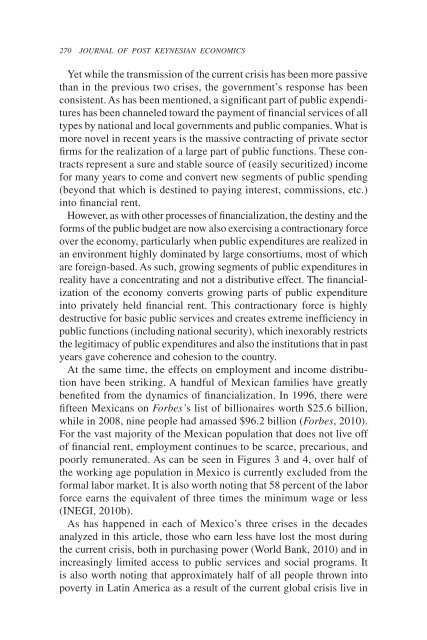Financialization in Mexico - Dr. Gregorio Vidal
Financialization in Mexico - Dr. Gregorio Vidal
Financialization in Mexico - Dr. Gregorio Vidal
Create successful ePaper yourself
Turn your PDF publications into a flip-book with our unique Google optimized e-Paper software.
270 JOURNAL OF POST KEYNESIAN ECONOMICS<br />
Yet while the transmission of the current crisis has been more passive<br />
than <strong>in</strong> the previous two crises, the government’s response has been<br />
consistent. As has been mentioned, a significant part of public expenditures<br />
has been channeled toward the payment of f<strong>in</strong>ancial services of all<br />
types by national and local governments and public companies. What is<br />
more novel <strong>in</strong> recent years is the massive contract<strong>in</strong>g of private sector<br />
firms for the realization of a large part of public functions. These contracts<br />
represent a sure and stable source of (easily securitized) <strong>in</strong>come<br />
for many years to come and convert new segments of public spend<strong>in</strong>g<br />
(beyond that which is dest<strong>in</strong>ed to pay<strong>in</strong>g <strong>in</strong>terest, commissions, etc.)<br />
<strong>in</strong>to f<strong>in</strong>ancial rent.<br />
However, as with other processes of f<strong>in</strong>ancialization, the dest<strong>in</strong>y and the<br />
forms of the public budget are now also exercis<strong>in</strong>g a contractionary force<br />
over the economy, particularly when public expenditures are realized <strong>in</strong><br />
an environment highly dom<strong>in</strong>ated by large consortiums, most of which<br />
are foreign-based. As such, grow<strong>in</strong>g segments of public expenditures <strong>in</strong><br />
reality have a concentrat<strong>in</strong>g and not a distributive effect. The f<strong>in</strong>ancialization<br />
of the economy converts grow<strong>in</strong>g parts of public expenditure<br />
<strong>in</strong>to privately held f<strong>in</strong>ancial rent. This contractionary force is highly<br />
destructive for basic public services and creates extreme <strong>in</strong>efficiency <strong>in</strong><br />
public functions (<strong>in</strong>clud<strong>in</strong>g national security), which <strong>in</strong>exorably restricts<br />
the legitimacy of public expenditures and also the <strong>in</strong>stitutions that <strong>in</strong> past<br />
years gave coherence and cohesion to the country.<br />
At the same time, the effects on employment and <strong>in</strong>come distribution<br />
have been strik<strong>in</strong>g. A handful of Mexican families have greatly<br />
benefited from the dynamics of f<strong>in</strong>ancialization. In 1996, there were<br />
fifteen Mexicans on Forbes’s list of billionaires worth $25.6 billion,<br />
while <strong>in</strong> 2008, n<strong>in</strong>e people had amassed $96.2 billion (Forbes, 2010).<br />
For the vast majority of the Mexican population that does not live off<br />
of f<strong>in</strong>ancial rent, employment cont<strong>in</strong>ues to be scarce, precarious, and<br />
poorly remunerated. As can be seen <strong>in</strong> Figures 3 and 4, over half of<br />
the work<strong>in</strong>g age population <strong>in</strong> <strong>Mexico</strong> is currently excluded from the<br />
formal labor market. It is also worth not<strong>in</strong>g that 58 percent of the labor<br />
force earns the equivalent of three times the m<strong>in</strong>imum wage or less<br />
(INEGI, 2010b).<br />
As has happened <strong>in</strong> each of <strong>Mexico</strong>’s three crises <strong>in</strong> the decades<br />
analyzed <strong>in</strong> this article, those who earn less have lost the most dur<strong>in</strong>g<br />
the current crisis, both <strong>in</strong> purchas<strong>in</strong>g power (World Bank, 2010) and <strong>in</strong><br />
<strong>in</strong>creas<strong>in</strong>gly limited access to public services and social programs. It<br />
is also worth not<strong>in</strong>g that approximately half of all people thrown <strong>in</strong>to<br />
poverty <strong>in</strong> Lat<strong>in</strong> America as a result of the current global crisis live <strong>in</strong>


